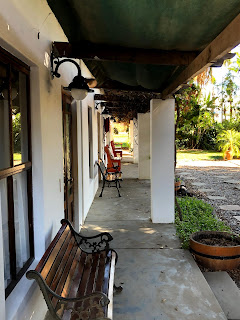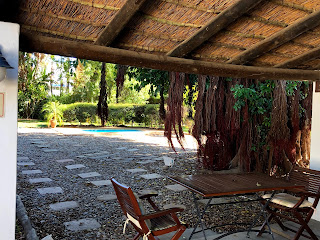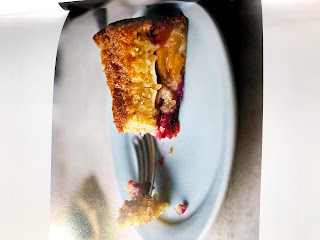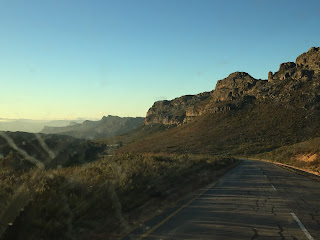Last night I dreamt that I visited Saint du Barrys twenty-five years hence. It was autumn, and the leaves had rusted and reddened and those that had already fallen seemed to have chosen the ground on purpose. The air was quieter than I had ever known, and as I stood, peering about, a little perplexed, a robin cheered at me, a bright young fellow, no doubt generations and generations away from the families that we had known all those years before.
The place was empty, dream-like itself, and I hesitated to renew acquaintance, wondering who and what I should meet. And as I waited it seemed to me that I stepped back into so many stories of childhood and adolescence, remembering places I'd visited in my imagination but felt nonetheless to be as real as the ground on which I stood, complete with the pebbles we had put there, replacing the grass that had too much shelter from the great tree. I thought of the mystique of Manderley, and its fiery end, and all its enticingly mocking moods.
I thought of Wuthering Heights, and plaintive Cathy at the window, begging to be let in.
And I thought of Misselthwaite Manor and its secret garden, also with its own robin.
The sense of place blurred, somewhere deep in the heart, and I began to understand something of the gift we had received at Saint du Barrys, by way of crossing the stories of the place, our lives and the many, many people who had rested there, some more consciously, others barely off their cell-phones to eat breakfast.
I waited, in my dream, not wanting to rush into something I couldn't comprehend, and the details of so much swiftly reminded me of doors, dreams and visions that had come and gone, like the visitors themselves.
And what of Saint du Barrys' own story? That it had been part of a school that burnt down? That it was rebuilt as a guest house and we were the third and longest owners? And was I simply cheeky to feel it as much of a presence as those dwellings in time-honoured stories?
And indeed, in my dream, I could sense our guests telling friends and family snippets of their stay at Saint du Barrys, and those snippets being carried on and on, like an African Grey's memory, recalling many moments which as memory would have it, could last long in contemplative absorption or pass as quickly as a whistle-stop.
Being myself I wanted to open the door and shout something to rouse everything into wakefulness, but the dream was too strong. It asked me to wait, and see.
And certainly, there was so much more to the waterfall of realisation: the immense presence of that massive tree, the corridors of communication that had opened between people from all continents, and the dreams of the animals themselves, from the cats to the otters, harrier-hawks, martial eagles, geckos, rain-spiders, striped mice to the single bad-tempered mole-snake. And Where-Are-You, the rescue hadeda. And the bandaged starling, for whom the whole flock waited until the last split-second before clearing off in a short chaos of wings. And the Barry-dogs.
And I realised that there would be no waking from this strange dream, that being midway from twenty-five years ago and twenty-five years hence was a juncture in itself, and that I was being shown things of importance that suggest no communication is coincidental.
So the secret was kept, for the time being, and all our stories rested, no doubt waiting for the dawn chorus.






















































